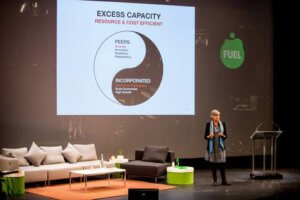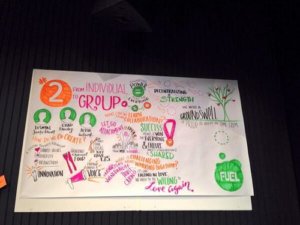
Last Thursday, I was lucky enough to get to attend the first Fuel Vancouver. For those that are unfamiliar, Fuel provides an avenue to generate public dialogue around social, technological, and environmental shifts that are happening around us. There was a ton to absorb throughout the day: the keynote speakers spoke about some great ideas, a number of panelists provided snippets of anecdotal insight, and future forecasts were a glimpse into what our world was headed towards.
While I’d love to give a full account on what the day looked like, I’ll keep it brief and summarize and reflect on some of the points I thought were interesting.

Conducting Business
Robin Chase (follow her on Twitter! @rmchase) was the first keynote speaker. She’s founded Zipcar and Buzzcar, both built on the idea that the excess capacity of our resources could be flipped to be an abundance of resources. Excess capacity is about sharing what is not always in use. As an example, people are not driving their cars every hour of the day. Most of the time, the car is parked somewhere. If we allowed people to share the car and only pay for the time they used it, we can smartly move our resources around to move towards a sharing economy, which is efficient, scalable, and sustainable.
This is how businesses like AirBnB have been able to shake entire industries in just a few years. By using what already existing—in this case, people’s spare guestrooms—they were able to offer 625,000 rentable rooms around the world in just 4 years. It’s taken Hilton Hotels 93 years to do the same.
When we remove the need to build new things, we are creating more efficient businesses. Not only that, it’s way less harmful to our environment! Looking at it in this way, it becomes quite clear that this is the kind of business model that isn’t just a profit incentive, but a necessity.
Millennials
There was quite a discussion around millennials because they are our next generation of leaders and change-makers (Ian Pierpoint of TheSoundHQ has cool things to say about this). They’re also the group that was most willing to take a pay cut to work a job that created positive social impact. Funnily enough, 43% also require financial assistance from their parents, and 30% of 30-year old millennials are still living at home. But they’re a generation that sign petitions, donate to charity, volunteer their time, and take action for what is right.
“Toxic ambition”—this is what millennials are plagued with. They are the generation that experiences the most anxiety and stress because the weight of doing something good is constantly on their shoulders. The media doesn’t shy away from sobering images of war, abuse, exploitation, poverty, and injustice. Millennials have seen it all—probably too soon— and they’re out to fight a good fight. Growing up with their parents’ “anything is possible” encouragement, they’ve been instilled with a sense of hope and optimism to reinvent culture, politics, and society’s landscape.
Being one of the millennials in the audience myself, it was interesting to see what take Gen X (seems like most of the speakers were Gen X’ers or on the cusp of Gen X and Gen Y) had on us. There’s a lot of talk about our predecessors leaving an unsightly world for us to deal with, but when what’s done is done, I think the important thing here—not just for millennials, but for everyone—is to focus on building a sustainable future we would like to live in.

Human Connection
Connection seemed to be a theme that many speakers touched on in one way or another, whether it be group interconnectedness or connections with individuals.
One of my favourite lines of the day was “stories don’t occur in silos,” (the words of Naveen Girn, @naveen_girn) meaning that whatever happens to an individual or single community will have an impact on many communities. If something were to happen on Commercial Drive, you can bet its story would affect beyond just the Italian or restaurant community. We need to understand that we are all connected.
But as humans, we need to feel connected and like we belong. We often hear that Canada is known for its multiculturalism; we’re a melting pot of languages, traditions, and beliefs. While certainly true, we mustn’t make the mistake in thinking that contact and exposure translates into an understanding of culture (follow Alden Habacon, @aldenhabacon, too!). As an example, if I go for dimsum every week, this doesn’t mean I understand Cantonese culture. Being understood and feeling accepted goes a long way towards the well-being and happiness of each of these cultures and communities, which directly affect our city.
What are some of the ways we can feel connected? Co-creation is one way. While this is a process that takes some getting used to, it is a powerful one. People bring different values and diversity to the table and when they contribute ideas and allow others to build on it, what results is innovation. Physically building is another way to connect. Using our hands to build something can bring people closer because they’ll feel more ownership over the project and they want to come back to it.
This is where the big push for design-thinking comes into play. Research entails ethnography and building empathy for the user. Co-creation is a part of collaboration and prototyping—building lots of small test solutions—is crucial to our process. Designers are in the business of enforcing human connection.
The day ended on a note that was perhaps the biggest takeaway for me: we all have a social responsibility. More than ever, we should have a sense of urgency and know that there is a need for us to take action in creating a future where everyone and everything can co-exist in harmony.
This was the daytime portion of Day 1 out of 2. For more details and the full itinerary and line up of speakers, visit the Fuel Vancouver website and consider going to the 2015 show!
Elsa
Published by: Reg Dick in Experiences